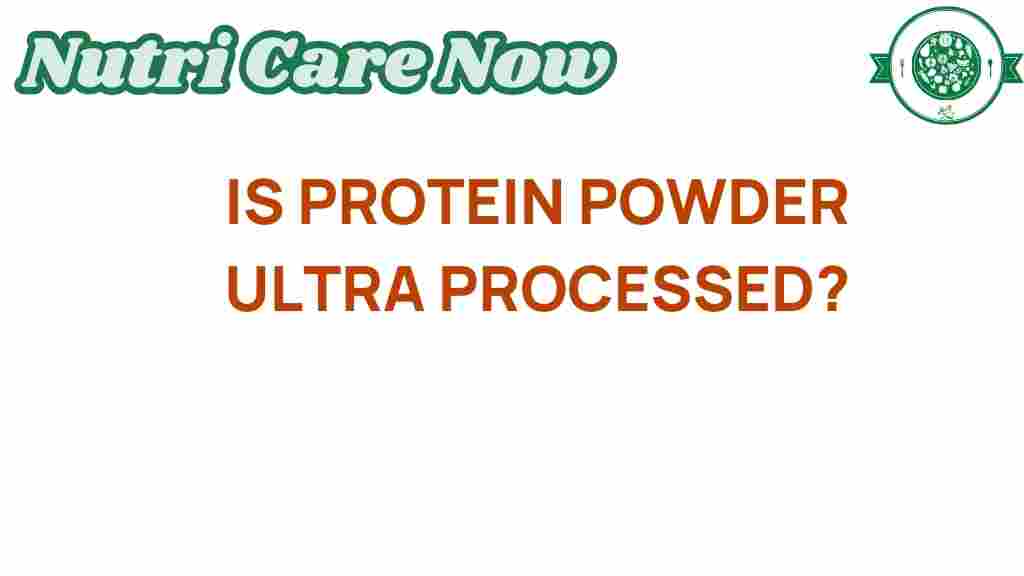Is Protein Powder the Ultimate Ultra-Processed Food?
In recent years, the fitness and wellness industries have seen a surge in the popularity of protein powder. This supplement is often hailed as a convenient way to meet daily nutritional needs, particularly for those engaged in fitness and health trends. However, as discussions around ultra-processed foods gain traction, it’s essential to scrutinize whether protein powder fits this category and what implications this has on our nutrition and overall health.
Understanding Protein Powder
Protein powder is derived from various sources, including whey, casein, soy, pea, and rice. It’s primarily used to enhance protein intake in diets, especially for athletes, bodybuilders, or anyone looking to increase muscle mass or aid in recovery. It can be consumed in shakes, added to smoothies, or even incorporated into baked goods.
The Rise of Ultra-Processed Foods
Ultra-processed foods are defined as those that have undergone significant industrial processing, which often includes the addition of ingredients not typically found in a home kitchen, such as artificial flavors, preservatives, and emulsifiers. These foods are designed to be convenient, palatable, and shelf-stable, but they often come with nutritional drawbacks.
In the context of protein powder, we must consider whether these products are merely convenient supplements or if they fall into the realm of ultra-processed foods that could potentially impact our health negatively.
Nutrition and Health Trends Surrounding Protein Powder
The health trends of the past decade have increasingly emphasized the importance of protein in our diets. This shift in dietary choices is partly due to the rise of fitness culture and the promotion of high-protein diets, such as keto and paleo. Many individuals are turning to protein powder to enhance their nutritional intake.
Benefits of Protein Powder
- Convenience: Protein powder is easy to use, making it simple to increase protein intake without preparing complex meals.
- Muscle Recovery: Many athletes use protein powder to aid in muscle recovery post-workout.
- Weight Management: Protein can help with satiety, potentially aiding in weight loss or maintenance.
- Dietary Flexibility: For vegetarians or vegans, plant-based protein powders offer an alternative to traditional protein sources.
Potential Drawbacks of Protein Powder
Despite the benefits, there are concerns regarding the consumption of ultra-processed protein powders:
- Added Sugars and Chemicals: Many protein powders contain added sugars, artificial sweeteners, and other unhealthy additives.
- Nutrient Imbalance: Relying too heavily on supplements can lead to imbalances in nutrition, neglecting whole food sources.
- Digestive Issues: Some individuals may experience bloating or other digestive discomfort from certain protein powders.
- Long-term Health Effects: The long-term effects of consuming highly processed protein supplements remain unclear, raising concerns among health experts.
Step-by-Step: Choosing the Right Protein Powder
When selecting a protein powder, consider the following steps to ensure you make an informed choice:
1. Identify Your Goals
Are you looking to build muscle, lose weight, or simply increase your protein intake? Understanding your goals will help you choose the right type of protein.
2. Research Protein Sources
Protein powders come from various sources. Common options include:
- Whey Protein: Fast-absorbing and high in essential amino acids, ideal for post-workout recovery.
- Casein Protein: Slow-digesting, great for overnight muscle recovery.
- Plant-Based Protein: Options like pea, hemp, and rice protein are excellent for vegans and those with lactose intolerance.
3. Check Ingredient Lists
Choose protein powders with minimal ingredients, avoiding those with artificial additives, fillers, and excessive sugars. Look for:
- Natural sweeteners (like stevia) instead of artificial ones.
- Whole food ingredients, if possible.
4. Evaluate Protein Content
Check the protein content per serving and ensure it aligns with your dietary needs. A good protein powder should provide at least 20 grams of protein per serving.
5. Consider Allergens
If you have food allergies or intolerances, ensure the protein powder you select is free from those allergens. Common allergens include:
- Dairy (found in whey and casein).
- Gluten (in some plant-based powders).
- Eggs.
6. Test for Digestibility
Start with a small serving to see how your body reacts to the protein powder. If you experience digestive discomfort, you may need to try a different brand or source.
Troubleshooting Tips for Protein Powder Users
If you encounter issues while using protein powder, consider these troubleshooting tips:
Digestive Issues
If you experience bloating or discomfort, try:
- Switching to a different protein source (e.g., from whey to plant-based).
- Reducing the serving size and gradually increasing it as your body adjusts.
Unpleasant Taste
If the flavor of your protein powder is unappealing, consider:
- Mixing it with smoothies, fruits, or nut butter for improved taste.
- Choosing flavored versions or brands known for better taste profiles.
Inadequate Results
If you’re not seeing the results you desire, evaluate:
- Your overall diet and ensure you’re consuming enough whole foods.
- Your workout regimen to ensure it aligns with your fitness goals.
Conclusion: Evaluating Protein Powder in the Context of Ultra-Processed Foods
While protein powder offers convenient benefits, it is crucial to recognize its classification as an ultra-processed food. This categorization prompts us to evaluate its place in our diets critically. Whole food sources of protein should ideally form the foundation of our nutrition, supplemented by protein powders when needed.
In the quest for optimal nutrition and health trends, it is essential to make informed dietary choices that prioritize whole foods while using supplements judiciously. Always consider your individual health needs, consult with a healthcare professional or nutritionist, and stay informed about the impact of ultra-processed foods on your wellness journey.
For more insights into dietary choices and food science, check out this comprehensive guide on nutrition.
Ultimately, the decision to include protein powder in your diet should be based on a thorough understanding of your health goals and a commitment to maintaining a balanced and nutritious diet.
This article is in the category Supplements and created by NutriCareNow Team
